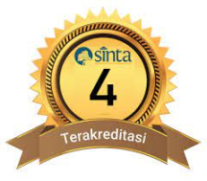META ANALYSIS OF THE EFFECT OF THE USE OF PhET SIMULATION ON LEARNING OUTCOMES OF PHYSICS OF SMA/MA STUDENTS
Abstract
PhET simulation is an interactive learning simulation that has been widely studied by previous researchers. This study aims to determine the effect size using the meta-analysis method from previous studies.This type of research is a meta-analysis research. Meta-analysis is research that summarizes research data that has been previously researched and the data are quantitative. The articles analyzed were 26 articles. Data analysis technique is done by calculating effect size using Cohen's equation.
The results of the study: the effect size value of the effect of using PhET simulation on learning outcomes of 0.723 is classified as moderate and it is proven that the use of PhET simulation is effectively applied to improve physics learning outcomes of SMA/MA students. The highest category effect size values obtained are: First, it occurs at the level of class X [ES 0.898] with the level of confidence in the data in class XI. Second, on the Fluid material [ES 1.174] with a high level of confidence the data on the Elasticity material. Third, the Demonstration method [ES 1.08] with a high level of confidence in the data on the Simulation method. Fourth, the Conceptual Change model [ES 1.040] with a high level of confidence in the data on the Discovery Learning model. Fifth, on the Skill aspect [ES 0.795] with a high level of confidence in the data on the Knowledge aspect.
References
Zulazhari, D. Djama, Yulkifli and Festiyed, Preliminary study of the use of games interactivemultimedia module to increase critical thinking of student in senior high school, IOP Publishing, 2018.
Peraturan Menteri Pendidikan dan Kebudayaan Republik Indonesia Nomor 36 Tahun 2018 Tentang Perubahan Atas Peraturan Menteri Pendidikan Dan Kebudayaan Nomor 59 Tahun 2014 Tentang Kurikulum 2013 Sekolah Menengah Atas/Madrasah Aliyah. .
C. S. Putri, dkk, “Pengaruh Penerapan Model Pembelajaran Creative Problem Solving Untuk Meningkatkan Kemapuan Berpikir Kreatif Dalam Pemecahan Masalah Fisika Pada Sisswa SMA”, Jurnal Pendidikan Fisika, Vol. 7 (2), 2019.
Asrizal, A. Hendri, Hidayati and Festiyed “Penerapam Model Pembelajaran Penemuan Mengintegrasikan Laboratorium Virtual dan Hots untuk Meningkatkan Hasil Pembelajaran Siswa SMA Kelas XI”, Prosiding Seminar Nasional Hibah Program Penugasan Dosen ke Sekolah (PDS), Padang: Universitas Negeri Padang, hal. 49-57, 2018.
K. Rasyidah, Supeno, and Maryani, Pengaruh Guided Inquiry Berbantuan Phet Simulation terhadap Hasil Belajar Siswa SMA Pada Pokok Bahasan Usaha Dan Energi, Jurnal Pembelajaran Fisika, Vol. 7(2), hal 129-134, 2018.
B. Sherin, Common Sense Clarified: The Role of Intuitive Knowledge in Physics Problem Solving, Journal Of Research In Science Teaching, Vo. 43(6), pp 533-555, 2006.
Turnip, dkk, Pengaruh Model Pembelajaran Problem Solving Dengan Integrasi Karakter Terhadap Pembentukan Karakter Dan Hasil Belajar Siswa Pada Materi Pokok Persamaan Gas Ideal Di Kelas XI SMASwasta Sri Langkar Kecamatan Tanjung Pur T.P.2011/2012, Jurnal INPAFI, Vol 1(1), 2013.
Festiyed, dkk, Meta Analisis Bahan Ajar Terintegritasi Materi Mitigasi Bencana Alam Terhadap Kompetensi Peserta Didik, Pillar Of Phyysics Education, Vol. 12(4), pp 857-864, 2019.
Adlina, R. Sondang, Manurung and A. Yuli, Efektivitas Model Discovery Learning Berbantuan Simulasi PhET Terhadap Hasil Belajar Fisika Di Kelas X SMA Swasta Al-Washliyah 1Medan , Jurnal INPAFI, Vol. 7(4), pp 9-16, 2019.
K. Perkinns, dkk, The Physics Teacher, PhET: Interactive Simulations for Teaching and Learning Physics, Vol. 44, pp 18-23, 2006.
Evani Doana Nababan and Makmur Sirait, Pengaruh Model Pembelajaran Inquiry Training Berbantuan Media PhET Terhadap Hasil Belajar Siswa Pada Materi Fluida Statis Kelas X Semester II SMA Negeri 1 Raya, Jurnal Ikatan Alumni Fisika Universitas Negeri Medan, Vol. 2(3), 2016.
Z. Arifin and A. Setiyawan, Pengembangan Pembelajaran Aktif Dengan ICT, Yogyakarta: Skripta Media Kreatif, hal. 124 , 2006.
G. Martinez, F.L. Naranjo, A. L. Perez and M.I. Suero, Cooparative Study Of The Effectiveness Of Three Learning Environments: Hyper-Realistic Virtual Simulation, Tradisiona Schematic Simulation And Traditional Laboratory, Phys. Rev. ST. Phys. Educ. Res, Vol.7, 2011.
Okimustava, Ishafit, N. Suwondo, R. Resmiyanto and A. Praja, Pengembangan Kuliah Eksperimen Fisika dengan Teknologi Multimendia, JRKPF UAD, Vol. 7, pp 1-4, 2014.
M. E. D. Yuafi and Endryansyah, Pengaruh Penerapan Media Pembelajaran PhET (Physics Education Technology) Simulation Terhadap Hasil Belajar Siswa KELas X TITL Pada Standar Kompetensi Mengaplikasikan Rangkaian Listrik di SMKN 7 Surabaya, Jurnal Pendidikan Electro UNESA, Vol. 4 (2), pp 407-414, 2015.
N. Sudjana and A. Rivai, Media Pengajaran. Bandung: Sinar Baru Algensindo, 2010.
Asrizal and Arjuna Nora., Meta Analysis Of The Influence Of Problem Based Learnig Models In High School Physics Students On Student Learning Outcomes: Pillar Of Physics Education, Vol. 13 (4), pp 494-501, 2020.
Retnawati, Heri, dkk, Pengantar Meta Analisis, Sorowajan Baru Yogyakarta: Publishing, 2018.
DOI: http://dx.doi.org/10.24036/12625171074








